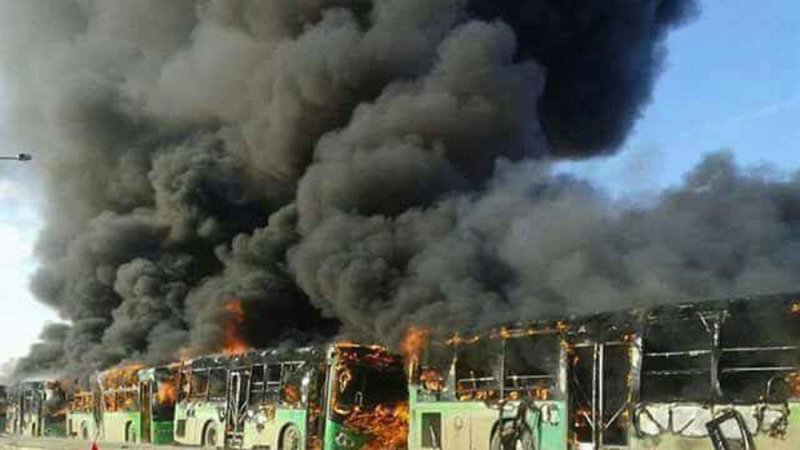A handout photograph made available on Monday by the official Syrian Arab News Agency it said shows flames and smoke rising from green government buses, used to evacuate people from areas besieged by rebels, after they were set ablaze, in Idlib province, Syria on Sunday. Photo by SANA/European Pressphoto Agency
BEIRUT -- Syrian rebels have surrendered eastern Aleppo, their last key urban stronghold, after a brutal 6-month siege in which much of the historic city was reduced to rubble. Syrian President Bashar al-Assad is now expected to unleash a new offensive against opposition forces in northern Syria.
The fall of eastern Aleppo, which rebel groups had held since mid-2012, marked a decisive moment in the nearly 6-year-old Syrian war as Assad's forces reportedly rampaged through the streets summarily executing dozens of suspected rebels.
It capped a 15-month blitz spearheaded by Russian air power and Iranian-led ground forces in which Assad seized control of central and western Syria, territory known as "useful Syria" that may define the post-war state.
This has given the regime, which in mid-2015 was facing defeat, an immense boost while delivering the heaviest blow the rebels have suffered since 2012, critically undermining their position at the negotiating table.
It is, however, clear that the multisided conflict that has killed an estimated 400,000 people and driven 11 million from their homes is far from over.
There are still 150,000 rebels of various stripes in Idlib province, which neighbors Aleppo in northwestern Syria, and thousands more, including the Islamic State, in the east and south.
Analyst Charles Lister of the Middle East Institute in Washington, who has spent years in the region, said the mainstream opposition in the north was about to "transform itself into a guerrilla-type insurgency in 2017."
The rebel factions are riven by ethnic and ideological rivalries but they can still give Assad a bloody nose.
Witness IS's lightning and opportunistic seizure of the historic city of Palmyra, 124 miles east of Aleppo, on Dec. 11 while Assad's forces were concentrated on Aleppo. The army reportedly put up little resistance in a city it took from IS in March.
Assad controls all of Syria's major cities and their environs — about 40 percent of Syrian territory — and he has grandiosely vowed to regain "every inch" of the country, even though his army has been seriously reduced by combat losses, desertions and massive draft-dodging.
Russia, and to a lesser extent Iran, do not endorse this objective. They have their own strategic imperatives in Syria and are reluctant to step up the increasingly costly military operations there, which would escalate a conflict that could drag in more outside powers.
With the rebels reeling after Aleppo, what Saudi Arabia, Turkey and Qatar — their biggest backers — do in the next few weeks could be critical.
With the war shifting toward Idlib, the geopolitical consequences could be game-changing, with Iran, in particular, making significant gains.
This means, observed Syria expert Joshua Landis of the University of Oklahoma in the United States, "that a new security architecture is being laid down in the northern Middle East... in which pro-Iranian governments are consolidating their grip...
"This has caused great grief and consternation in Saudi Arabia and among many of the United States' allies"" he told the PBS public television network.
This article originally appeared at The Arab Weekly.















